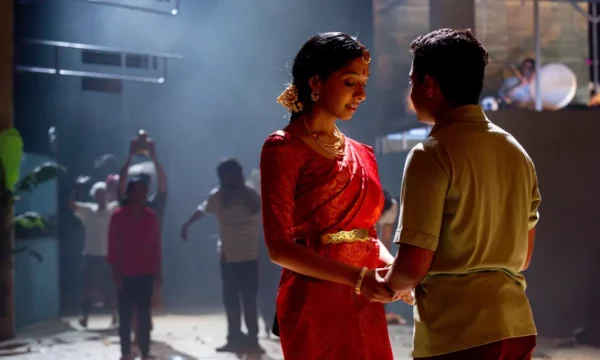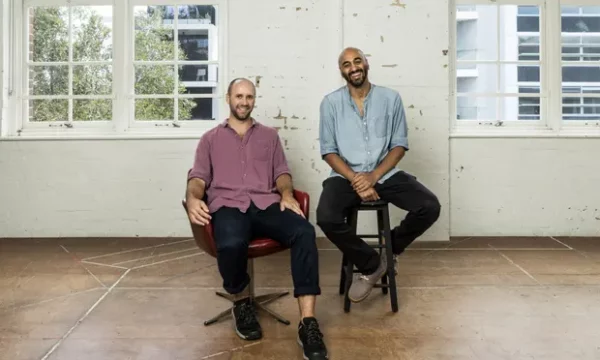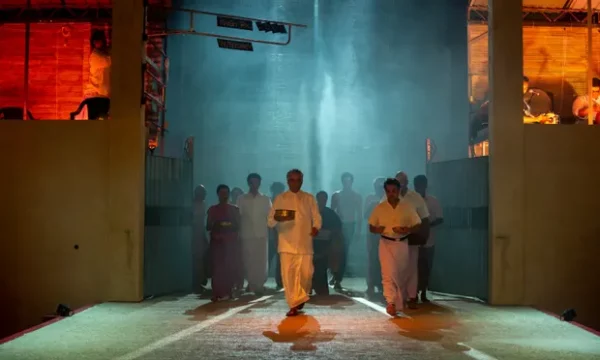‘An epic drawn from real life’: the radical hit play about a Sri Lankan family’s journey – By Neelam Tailor

Secrets and lives … Belvoir Street theatre’s Counting and Cracking, which premiered in Sydney, 2019. Photograph: Brett Boardman Photography
Source : theguardian
Counting and Cracking, a multilingual tale of a family’s migration to Australia, is coming to the UK. Its writer Shakthi and director Eamon Flack discuss the inspiration behind this labour of love
“Australia is a country of immigrants,” says Counting and Cracking director Eamon Flack. He’s not wrong: nearly 60% of the population are immigrants from Europe who began arriving about 250 years ago; Indigenous people make up just over 3%. After England, the top countries where overseas-born immigrants come from are India and China. Yet until Counting and Cracking, there hadn’t been a major theatrical work in Australia about a non-white migrant family. “To put it plainly, I don’t think there’s been a play of this scale with 19 people who are all brown,” says the play’s creator S Shakthidharan, known as Shakthi.
Shakthi, an Australian storyteller with Sri Lankan heritage and Tamil ancestry, has more than made up for that with Counting and Cracking. The play, which made its sell-out debut at Sydney Town Hall in 2019, spans four generations of a Sri Lankan Australian family over nearly half a century in two countries. Featuring more than 50 characters played by 16 actors in three languages, it won seven Helpmann awards (Australia’s answer to the Oliviers), beating international mega-hit Harry Potter and the Cursed Child. Now the production is on its way to the UK where it will take audiences in Edinburgh and Birmingham through this affecting, and surprisingly funny, multi-generational tale of love, family secrets, civil war and migration.
The play first introduces us to Radha and her son, Siddhartha, living in Sydney in the mid 2000s. Radha fled Sri Lanka decades before at the start of the civil war and has set up a new life. The pair’s worlds are far apart. They bicker as Siddhartha struggles with his dual identity, at one point insisting: “I’m not Sri Lankan; I’m Australian.” All the while Radha, like many people forced to flee their homeland, keeps silent about her trauma and experiences. When they receive a call from Siddhartha’s father, who was thought to be dead for 21 years, Radha is forced to reckon with secrets she buried, and we’re taken on an epic journey through Sri Lanka in the 1950s, 70s, and 80s. Mysteries unravel, and the question of whether or not the family will reunite in Australia remains throughout.
“It’s as much an Australian story as any,” says Shakthi. The way the story resonated with people from all backgrounds came as a welcome surprise to both Shakthi and his fellow Sri Lankans in the audience. “Every night, I would have emotional discussions with Sri Lankans I talked to after the show, but then they would say: ‘I can’t believe other people are coming to this show and are interested in it.’ It was kind of a radical act of belonging for us as a community,” the 40-year-old playwright says.
Part of what makes Counting and Cracking so radical is the way in which Shakthi represents his community in all its fullness, embracing different languages. Large parts of the play are spoken in Sinhalese and Tamil, and are translated into English afterwards by other characters in the ensemble. “I think a lot of migrants live their full selves in private. In the public sphere, they often have an assimilated version of themselves. It’s just a relief to not do that. This is our community and we’re not hiding any of it,” says Shakthi.
Flack believes the play’s use of multiple languages creates a feeling of togetherness and interdependence within the audience. “It creates a kind of community in the theatre, because no one can watch this without help from other people, which is the whole point.” He continues, “The whole thing is a sort of act of translation, whether it’s literal translation of language or translation of memory, or of different experiences. The many points of view can only be carried by many different people working together.”
Over the past 13 years, Shakthi has interviewed hundreds of family members and Sri Lankans around the world. “It’s like this epic mosaic that’s drawn from the stuff of real life,” he says. When he started doing these interviews, he wasn’t planning on writing a play. In his 20s, he realised he knew more about the second world war than about how his own family had travelled to Australia, so he went to Sri Lanka against his mother’s wishes to uncover his own story. Counting and Cracking takes in the entire period of the civil war, and the fighting between the two main ethnic groups: the Sinhalese and Tamils. But this play isn’t the pitting of two groups against each other that we often see in the media. Shakthi found a very different story from those who lived through the war: “It’s such an interwoven country. Colombo is a city where there’s a church next to a mosque next to a temple.” What really divided Sri Lanka, he says, was “the politics of division”, a tool the powerful used to gain control. Counting and Cracking shows us the families torn apart by this politics, and the many people, Sinhalese and Tamil, who tried to stop it.
In his research, Shakthi learned about his great-grandfather, C Suntharalingam, who was born to farmers and became the only Tamil in Sri Lanka’s first cabinet after independence from Britain. The character of Apah (Siddhartha’s great-grandfather) is inspired by him and the title of the play comes from a letter he wrote. “Democracy is the counting of heads, within certain limits; and the cracking of heads beyond those limits,” Suntharalingam wrote.

‘It just got bigger and bigger’ … Eamon Flack, left, and Shakthi have been working together on the play for nine years. Photograph: Brett Boardman Photography/Brett Boardman
“I believe my great-grandfather was saying that democracy must be nurtured in order to survive,” Shakthi says. “If we test its limits too often in the pursuit of power, then we risk encouraging and hastening its demise.”
Over the past nine years, Shakthi has been working closely with Flack, who is artistic director at Sydney’s Belvoir theatre company, to develop the plot and direction. When asked what their collaboration is like, they both laugh. “Glorious,” says Flack. “We made a pact quite early on that we would only do it if we could do it properly. ‘If we’re really going to do this, then we need more actors. And we need to do this in multiple languages. And we need to cast internationally, and we need a bigger space.’ It just got bigger and bigger.”
The pair stuck to their pact closely, and took four years to cast the play because it was so important to find the right people. Much of the lineup was found through non-traditional means and the actors have lived very similar lives to their characters. “I don’t think either Eamon or I [will] get to make another show like this in our lifetime,” Shakthi says.
Across the play’s three and a half hours, you’ll be taken on a journey through a series of visually and sonically rich scenes. The characters swim at Bondi in the rain; there’s a wedding; a first kiss at a party; a bus full of refugees next to the beach; the front yard of a house; and the banks of a river. The costumes have been carefully designed to reflect each era and culture, with colourful saris draped in different ways depending on the time and character. The entire show is wrapped in the warm tones of traditional carnatic music. Three musicians, playing the Indian mridangam drum, flute and violin, create a river of sound that flows through the performance.

Illuminating … Counting and Cracking takes you on a journey through a series of visually rich scenes. Photograph: Brett Boardman
As Shakthi experienced, there is often a silence around the separation of Sri Lankan migrants from their homeland. His mother had been reluctant to talk about what her family experienced in Sri Lanka but as she became involved with Counting and Cracking, she felt safe to open up and much of what she spoke about ended up in the play. Shakthi believes the “younger generation needs to find a way to gently and carefully unlock their parents, and to allow those stories to be told”.
Flack remembers a beautiful moment he witnessed after a performance in Sydney: “There was a Sri Lankan family of four, the two kids were in their late teens and one of them suddenly turned to their parents and said: ‘So did anything like that happen to you?’ and you knew that was the first time they’ve had that sort of conversation.” This sparks a memory for Shakthi: “I was there where the same thing happened in reverse. I was sitting behind a Sri Lankan family and the mum turned to her son and said, ‘You know all of that happened to me.’ That’s why we do this, because these conversations aren’t just going to happen one night while you’re having tortellini or whatever.”
While the story has elements of trauma and pain, ultimately it instils hope in humanity, especially at a time when Sri Lanka is experiencing political turmoil, with a state of emergency called after mass demonstrations toppled its president. “The play is an offer to come and sit with, and journey with, the most deeply held truths of my community and to be part of that world, with us every step of the way,” Shakthi says. “And I don’t think that’s an experience you can have in any way except for coming to the show.”







